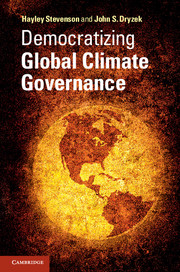Book contents
- Frontmatter
- Contents
- List of Tables
- Preface
- Acknowledgments
- List of Acronyms
- 1 The challenge of global climate governance
- 2 Global climate governance as a deliberative system
- 3 Governance with and without institutionalized authority
- 4 Authoritative global governance
- 5 Emerging centers of networked authority
- 6 Transmitting public concerns in the deliberative system
- 7 Accountability
- 8 Improving the global deliberative system
- 9 Conclusion
- References
- Index
7 - Accountability
Published online by Cambridge University Press: 05 June 2014
- Frontmatter
- Contents
- List of Tables
- Preface
- Acknowledgments
- List of Acronyms
- 1 The challenge of global climate governance
- 2 Global climate governance as a deliberative system
- 3 Governance with and without institutionalized authority
- 4 Authoritative global governance
- 5 Emerging centers of networked authority
- 6 Transmitting public concerns in the deliberative system
- 7 Accountability
- 8 Improving the global deliberative system
- 9 Conclusion
- References
- Index
Summary
Introduction
International politics contains numerous accountability mechanisms, though they have rarely been thought of and analyzed in democratic, still less deliberative, terms (and this lack of attention is especially true of international relations scholars). Accountability, especially of empowered authority to actors and discourses in public space, is central to any deliberative system. This chapter interprets and evaluates accountability mechanisms in the global governance of climate change in a deliberative systems light. This analysis necessitates extending our imaginations beyond traditional conceptualizations of political accountability that work from an image (though not necessarily the reality) of what happens in a sovereign democratic state.
Accountability is generally understood as the obligation of one individual or collective actor to explain and justify his or her actions to some other actors or body, with the possibility of sanction if the justification is not fully accepted. Sometimes this obligation is legally binding, but it may also arise more informally from cultural or institutional norms about appropriate and legitimate behavior (Bovens 2007: 450–1). Beyond this core defining feature, distinctions can be drawn across the actors, processes, standards, and consequences that are appropriate for accountability in different contexts. Accountability is thus performed and achieved differently in, for example, parliamentary, bureaucratic, corporate, community, and international institutional settings. Mashaw distils six general points that can guide evaluations of accountability in different contexts: “who is liable or accountable to whom; what they are liable to be called to account for; through what processes accountability is to be assured; by what standards the putatively accountable behavior is to be judged; and what the potential effects are of finding that those standards have been breached” (2006: 118).
- Type
- Chapter
- Information
- Democratizing Global Climate Governance , pp. 152 - 180Publisher: Cambridge University PressPrint publication year: 2014



